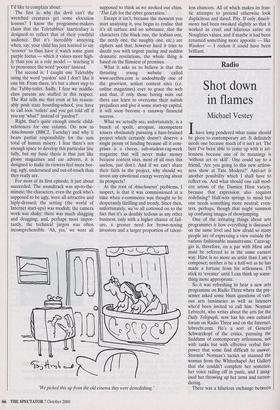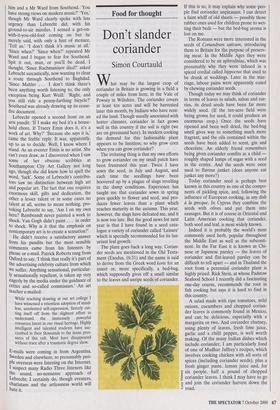Radio
Shot down in flames
Michael Vestey
Ihave long pondered what name should be given to contemporary art. It definitely needs one because much of it isn't art. The best I've been able to come up with is art- lessness because one of its meanings is `without art or skill'. One could say to a friend, 'Are you going to this new artless- ness show at Tate Modern?' Anti-art is another possibility which I shall have to reflect on. And what should one call mod- ern artists of the Damien Hirst variety, because that expression also requires redefining? Half-wits springs to mind but one needs something more neutral; even- ters, perhaps, though that might summon up confusing images of showjumping.
One of the irritating things about arts programmes is how everything is discussed on the same level and how afraid so many people are of expressing a view outside the various fashionable mainstreams. Caravag- gio is, therefore, on a par with Hirst and must be referred to in the same earnest way. Hirst is no more an artist than I am a composer; neither is he a half-wit as he has made a fortune from his artlessness. I'll stick to `eventer' until I can think up some- thing more appropriate.
So it was refreshing to hear a new arts programme on Radio Three where the pre- senter asked some blunt questions of vari- ous arts luminaries as well as listeners who'd been invited to call him. Norman Lebrecht, who writes about the arts for the Daily Telegraph, now has his own cultural forum on Radio Three and on the Internet, lebrecht.com. He's a sort of General Schwarzkopf of the critics, pursuing the Saddams of contemporary artlessness, not with tanks but with effective verbal fire- power that some find difficult to answer. Stormin' Norman's tactics so stunned the woman from the Whitechapel Art Gallery that she couldn't complete her sentence, her voice tailing off in panic, and I imag- ined her throwing up her arms and surren- dering.
There was a hilarious exchange between him and a Mr Ward from Southend. 'You have strong views on modern music?' Yes,' though Mr Ward clearly spoke with less urgency than Lebrecht did, with his ground-to-air missiles. I sensed a get-on- with-it-you-old-fool coming on but he merely said, with only a hint of menace, `Tell us.' I don't think it's music at all.' `Since when?' Since when?' repeated Mr Ward and I began to fear for Southend. Spit it out, man, or you'll be dead, I thought. 'Since Rachmaninov died?' asked Lebrecht sarcastically, now wanting to clear a route through Southend to Baghdad. `Since Mahler . . . I don't think there's been anything worth listening to, the only exception being Kurt Weill."Right, and you still ride a penny-farthing bicycle?' Southend was already drawing up its cease- fire document.
Lebrecht opened a second front on an arts pundit: 'If I make my bed it's a house- hold chore. If Tracey Emin does it, it's a work of art. Why?' Because she says it is,' came the feeble reply. It was, apparently, up to us to decide. Well, I know where I stand. As an eventer Emin is no artist. She can't even draw, as 1 discovered when I saw some of her obscene scribbles at Southampton City Art Gallery not long ago, though she did know how to spell the word, 'fuck'. Some of Lebrecht's contribu- tors saw no distinction between high art and popular art. The fact that one requires enormous skill, gifts and dedication, the other a lesser talent or in some cases no talent at all, seems to mean nothing, pro- voking Lebrecht to say, 'Am 1 on my own here? Rembrandt never painted a work to shock. Van Gogh didn't paint .. . in order to shock. Why is it that the emphasis on contemporary art is to create a sensation?'
He didn't receive a satisfactory answer from his pundits but the most sensible comments came from his listeners by phone or e-mail. Patrick Roberts rang from Oxford to say, 'I think that really it's part of the advertising celebrity culture from which we suffer. Anything sensational, particular- ly sensationally repellent, is taken up very eagerly by the media under the guidance of critics and so-called commissars.' An art teacher e-mailed:
While teaching drawing at our art college 1 have witnessed a relentless adoption of mind- less, untalented self-expression, fiercely cut- ting itself off from the slightest effort to understand the immensely powerful resources latent in our visual heritage. Highly intelligent and talented students have suc- cumbed in their thousands to the inane pres- sures of this cult. Most have disappeared without trace after a traumatic degree show.
E-mails were coming in from Argentina, Sweden and elsewhere, so presumably peo- ple overseas were listening on the Internet. I suspect many Radio Three listeners like the sound, no-nonsense approach of Lebrecht; I certainly do, though eventers, charlatans and the artlessness world will hate it.



















































































 Previous page
Previous page